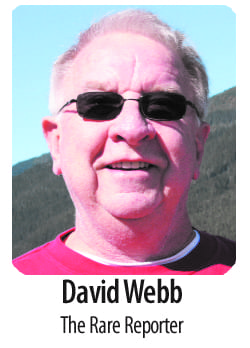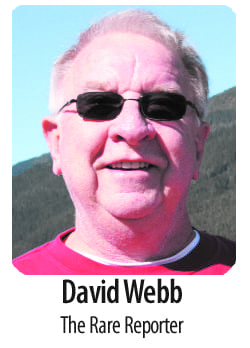Looking back on a life in the field of journalism
 When you count your blessings this month during gay Pride, don’t forget to say a word of thanks to the Dallas-Fort Worth mainstream media. You wouldn’t enjoy the freedom you experience today without the editors and reporters of those newspapers and television stations.
When you count your blessings this month during gay Pride, don’t forget to say a word of thanks to the Dallas-Fort Worth mainstream media. You wouldn’t enjoy the freedom you experience today without the editors and reporters of those newspapers and television stations.
My thoughts on mainstream media crystalized June 9 at the Sixth Floor Museum at Dealy Plaza, when I accepted an award from the Press Club of Dallas for “Excellence in Journalism” at the 2016 North Texas Legends ceremony. The club honored me along with some real bigshots, including retired Dallas Morning News columnist Steve Blow, who wrote countless missives over the years in support of the LGBT community.
I stood in heady company, and I worried about how I would stack up.
The beauty of your last name starting with one of the last letters in the alphabet is that you will likely be the last one called to speak, which I was. The horror of it is that you must dwell on what you are going to say when it comes your turn to talk.
When my turn came I mounted the stage, and I hoped the words would come from my heart and mind. It helped that the beautiful NBC Channel 5 host, Kristi Nelson, welcomed me warmly, and she gave me a boost of confidence.
Looking out at the audience that included stalwarts such as retired ABC Channel 8 anchor Gloria Campos and investigative reporter Brett Shipp — not to mention “legends” like former Dallas Times Herald journalist Hugh Aynesworth, who covered the John F. Kennedy assassination — I might have shrank. But that didn’t happen because I knew I stood in the company of good people.
So I told my story as it relates to journalism. It began at the age of about 10 in my native town of Childress. I would go to the newspaper office, and they would give me 10 newspapers to sell for 10 cents each. When I returned to the office with the money, I got to keep half of it.
Back in those days, a half-dollar bought a lot more than you might imagine. And I loved sodas and chocolate.
I knew from an early age I wanted to be a journalist, and I eventually made my way to the University of Texas at Austin where I earned a degree in journalism. I was a good student, but I graduated in terror. The thought of getting my first job in my chosen field scared me to death.
I will forever be grateful to Rich Heilland, the editor of a newspaper in the NewsTexas chain of suburban newspapers owned by the Belo Corp., for giving me my first job. I worked every beat at that newspaper — except sports — learning the basics of reporting. Someone asked me once to cover a football game, but they dismissed me from the project when I asked if they could explain the game to me first.
Everyone understood I was different, but no one challenged me on it. From the start, I gathered everyone would accept me if I carried my weight. I did.
At my next job at the Valley Morning Star in Harlingen I became increasingly alarmed about a new disease that came to be known as AIDS. I began dabbling in coverage of the epidemic, and I grew increasingly more interested in coverage of issues not routinely covered by the mainstream media.
My subsequent move to the Dallas Times Herald introduced me to William Waybourn, president of the Dallas Gay and Lesbian Alliance, whom I met at Dallas-Fort Worth International Airport during a protest he and his colleagues staged. It changed my career because their bravery so impressed me.
After leaving the Times Herald, I went to work as a staff writer at the Dallas Observer when it was still owned by the original founder, Bob Walton. The Observer reported LGBT news occasionally, but it left most of that to the newly-founded Dallas Voice that specifically served the gay community. I decided to change that, much to the distress of my editor, who reasoned that gay news should be in a gay newspaper and only occasionally reported by an offbeat weekly alternative publication.
Many “legendary” battles ensued between us over the coverage, but we made peace long ago and are good friends today. During that time, the Dallas chapter of the Gay and Lesbian Alliance Against Defamation presented me with an award for a story I wrote about a gay man and his ill partner, who later died of HIV complications.
It was a time of change, and all media outlets began reassessing their coverage of AIDS and LGBT issues. Once again, I became a little confused about my purpose in life, and I applied for a job at the Southern Poverty Law Center in Montgomery, Ala. To my utter amazement, they hired me, and I moved there.
After a couple of years of monitoring hate crimes and chasing white supremacist groups, I wanted to return home to Texas. I returned with an inspiration from SPLC founder Morris Dees and chief lawyer Richard Cohen that would influence the rest of my career. Dees and Cohen liked me, and they encouraged me to follow my heart.
I later applied for a job at the Dallas Voice, and editor Dennis Voice and publisher Robert Moore hired me. The next chapter of my career unfolded with me launching a new direction for myself and, to some extent, the weekly newspaper because Moore held a hands-off philosophy about editorial content. Many of the newspaper’s readers and advertisers never dreamed that the LGBT community would be held to strict, traditional standards of journalism and investigative reports in the pages of the publication.
Hostility often ensued, but the community eventually sorted it out.
From its start, Dallas Voice exhibited a unique presentation among LGBT publications. The newspaper printed news in an unbiased manner, and it attracted the notice of mainstream journalists who often sought assistance about local LGBT issues. The sense of respect spread to local officials and finally to the Dallas-Fort Worth community at large.
Today, I’m best known for my reporting and columns for the Dallas Voice. I retired from the publication about eight years ago, but I still contribute to it occasionally. I’m happy to be remembered for my work at the Dallas Voice, especially after my peers at the Press Club of Dallas told me it rose to the level of excellence.
This article appeared in the Dallas Voice print edition June 24, 2016.













